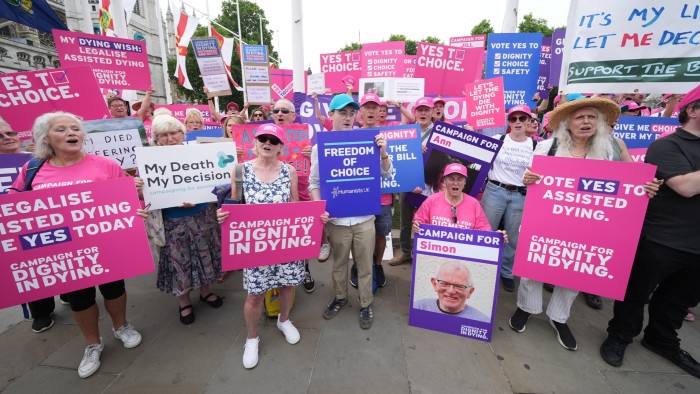
Unlock the Editor’s Digest at no cost
Roula Khalaf, Editor of the FT, selects her favorite tales on this weekly publication.
Britain’s MPs have narrowly voted to legalise assisted dying, backing a landmark invoice and paving the best way for one of the consequential societal shifts in many years.
The laws to permit anybody with six months or much less to reside to hunt assist to finish their very own life was carried by 314 to 291 votes and can now be pushed by to the ultimate stage of scrutiny within the Home of Lords.
The invoice would give anybody with a prognosis of lower than six months the appropriate to hunt help in ending their life, with any resolution requiring approval from two medical doctors.
If the legislation adjustments, England and Wales will be part of European nations corresponding to Switzerland, the Netherlands and Belgium, in addition to a number of US states, Canada, Australia and New Zealand in giving terminally ailing folks the selection to die.
Kim Leadbeater, the Labour MP who introduced ahead the laws, led the controversy on Friday and pleaded with colleagues to again the third studying of her personal members’ invoice. It handed with a majority of simply 23 votes.
“It isn’t typically we’re requested to wrestle with problems with morality, ethics and humanity,” Leadbeater informed MPs. She mentioned her invoice “isn’t a selection between dwelling and dying — it’s a selection for terminally ailing folks about how they die”.
The emotionally charged debate and vote on Friday befell towards a backdrop of demonstrations outdoors Westminster by each proponents and opponents of the legislation change.
The free vote marked the backing of one other important societal change from various comparatively new backbenches in a nonetheless younger parliament. On Tuesday, MPs reformed abortion laws in England and Wales to cease ladies from being prosecuted for ending their being pregnant.
Prime Minister Sir Keir Starmer was amongst those that backed the invoice in a free vote, which noticed MPs not whipped by their get together to vote a specific manner. Conservative chief Kemi Badenoch voted towards the invoice.
Opponents spanned the political spectrum from Labour MP and Mom of the Home Diane Abbott to former Conservative minister Sir James Cleverly, who warned it was unsuitable to “subcontract” additional scrutiny of the invoice to friends within the Home of Lords.
Critics of the invoice have warned that safeguards supposed to guard susceptible folks being pressured into ending their lives, such because the requirement for a Excessive Court docket decide to approve every case, have been watered down.
They’ve additionally mentioned the laws, which as a non-public members’ invoice can solely be debated on a Friday, had not obtained enough parliamentary scrutiny given the gravity of its implications.
Tom Tugendhat, a Conservative MP and former minister, warned the change in legislation would symbolize “an enormous shift within the relationship between the person and the state”.
The Terminally Unwell Adults (Finish of Life) Invoice handed on Friday has undergone a collection of amendments since MPs first voted in favour of the laws final yr.
It has been amended to take away the requirement for a Excessive Court docket decide to log out on every case. As an alternative, an oversight panel, together with a authorized determine corresponding to a KC and a psychiatrist, will think about every case.
Modifications additionally be certain that medical doctors or care employees won’t ever be compelled to participate in assisted dying if the service is obtainable in England.
In line with the federal government’s personal danger evaluation, printed earlier this yr, greater than 4,500 folks a yr would search help to finish their lives if the legislation got here into power.
Friends will now debate the invoice and will suggest amendments. If signed into legislation, as is now trying more and more probably, the invoice isn’t anticipated to come back into power till 2029.




